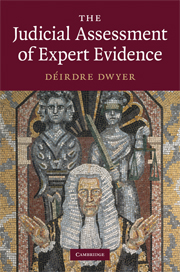Book contents
- Frontmatter
- Contents
- List of figures
- Preface
- Table of legislation
- Table of cases
- Introduction
- 1 General epistemological issues
- 2 Expert evidence as a special case for judicial assessment
- 3 Making sense of expert disagreement
- 4 Non-epistemological factors in determining the role of the expert
- 5 Assessing expert evidence in the English civil courts: the sixteenth to twentieth centuries
- 6 Assessing expert evidence in the English civil courts today
- 7 The effective management of bias
- Conclusion
- Appendix 1 Part 35 of the Civil Procedure Rules 1998
- Appendix 2 Tables of pre-1800 civil cases involving expert evidence
- Bibliography
- Index
- References
5 - Assessing expert evidence in the English civil courts: the sixteenth to twentieth centuries
Published online by Cambridge University Press: 01 July 2009
- Frontmatter
- Contents
- List of figures
- Preface
- Table of legislation
- Table of cases
- Introduction
- 1 General epistemological issues
- 2 Expert evidence as a special case for judicial assessment
- 3 Making sense of expert disagreement
- 4 Non-epistemological factors in determining the role of the expert
- 5 Assessing expert evidence in the English civil courts: the sixteenth to twentieth centuries
- 6 Assessing expert evidence in the English civil courts today
- 7 The effective management of bias
- Conclusion
- Appendix 1 Part 35 of the Civil Procedure Rules 1998
- Appendix 2 Tables of pre-1800 civil cases involving expert evidence
- Bibliography
- Index
- References
Summary
5.1 Introduction
This chapter is the first of a pair which examine in detail how epistemological and non-epistemological factors combine to produce a range of expert roles, taking English civil procedure as a case study. In this chapter, I examine the historical development of provisions intended to assist the assessment of expert evidence in the English civil courts. My time frame is from the end of the fifteenth century, when civil cases involving expert evidence are first recorded, through to the last days of the Rules of the Supreme Court at the very end of the twentieth century. The relationship between the Civil Procedure Rules 1998 and the effective assessment of expert evidence are the subject of Chapter 6, the second chapter in this pairing.
Some might approach this as an optional chapter within the book as a whole. What, after all, can legal history tell us about modern-day evidence law? This is both a normative question (what should legal history be entitled to tell us?) and an evidential question (how much do we know about the history of evidence law for it to be able to tell us anything useful?). The history of civil expert evidence is relevant to the modern-day question of its assessment in two ways. The first is that, by understanding the traditions of procedural and evidential thought and practice that have led us to where we are today, we might have a better understanding of relevant non-epistemological factors, such as are described in Chapter 4.
- Type
- Chapter
- Information
- The Judicial Assessment of Expert Evidence , pp. 238 - 281Publisher: Cambridge University PressPrint publication year: 2008

